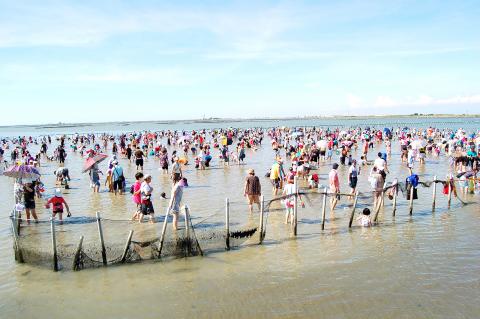A new law to ensure the conservation of the nation’s wetlands went into effect yesterday, the result of years of effort by environmental groups and government agencies.
Minister of the Interior Chen Wei-zen (陳威仁) said the newly enacted Wetlands Conservation Act (溼地保育法) was designed to protect wetlands and to establish regulations to manage economic activities within designated areas.
The law marked a break with traditional methods of wilderness conservation, as it allowed for certified local industries to continue through a system of certification and compensation measures, Chen said.

Photo: Yang Chin-cheng, Taipei Times
Local businesses in the agriculture, tourism and education sectors are to be encouraged to apply for certification through the ministry’s Wetland Mark system, Chen said.
The ministry currently lists 85 wetlands in the nation as designated protected areas, classified by three levels — local, national and international.
In accordance with principles adopted from the Ramsar Convention, a global convention on the protection of wetlands developed in Iran in 1971, the act is to encourage the “wise use” of wetland resources — seeking sustainability without excluding local human activities.
The act establishes mechanisms that allow for economic development in wetlands by requiring developers who pursue business activities to contribute to an environmental protection fund.
In line with the convention’s principle of “no net loss,” developers in wetlands can also partake in off-site restoration efforts of wetlands in other locations.
National Parks Division Deputy Director Ou Cheng-hsing (歐正興) said that the act would involve joint efforts between national land-use planning agencies, adding that over 10 supporting laws have been established since the passage of the act in 2013.
He added that increased awareness of the importance of wetlands — often described as “nature’s kidneys” due to their cleansing functions in ecosystems — have led to an increase in public participation at community events related to wetland conservation.
Efforts to initiate the landmark act of legislation were boosted in 2011 following two successful environmental movements against large-scale development projects — a proposed biotech research center in Taipei’s Nangang District (南港) wetlands and plans for a petrochemical complex in Changhua County’s Dacheng Wetlands (大城溼地).
The act received bipartisan support in the legislature, with lawmakers from both the pan-green and pan-blue camps enjoying a tour of Guandu Nature Park in Taipei yesterday to commemorate its enactment.

The brilliant blue waters, thick foliage and bucolic atmosphere on this seemingly idyllic archipelago deep in the Pacific Ocean belie the key role it now plays in a titanic geopolitical struggle. Palau is again on the front line as China, and the US and its allies prepare their forces in an intensifying contest for control over the Asia-Pacific region. The democratic nation of just 17,000 people hosts US-controlled airstrips and soon-to-be-completed radar installations that the US military describes as “critical” to monitoring vast swathes of water and airspace. It is also a key piece of the second island chain, a string of

A magnitude 5.9 earthquake that struck about 33km off the coast of Hualien City was the "main shock" in a series of quakes in the area, with aftershocks expected over the next three days, the Central Weather Administration (CWA) said yesterday. Prior to the magnitude 5.9 quake shaking most of Taiwan at 6:53pm yesterday, six other earthquakes stronger than a magnitude of 4, starting with a magnitude 5.5 quake at 6:09pm, occurred in the area. CWA Seismological Center Director Wu Chien-fu (吳健富) confirmed that the quakes were all part of the same series and that the magnitude 5.5 temblor was

The Central Weather Administration has issued a heat alert for southeastern Taiwan, warning of temperatures as high as 36°C today, while alerting some coastal areas of strong winds later in the day. Kaohsiung’s Neimen District (內門) and Pingtung County’s Neipu Township (內埔) are under an orange heat alert, which warns of temperatures as high as 36°C for three consecutive days, the CWA said, citing southwest winds. The heat would also extend to Tainan’s Nansi (楠西) and Yujing (玉井) districts, as well as Pingtung’s Gaoshu (高樹), Yanpu (鹽埔) and Majia (瑪家) townships, it said, forecasting highs of up to 36°C in those areas

IN FULL SWING: Recall drives against lawmakers in Hualien, Taoyuan and Hsinchu have reached the second-stage threshold, the campaigners said Campaigners in a recall petition against Chinese Nationalist Party (KMT) Legislator Yen Kuan-heng (顏寬恒) in Taichung yesterday said their signature target is within sight, and that they need a big push to collect about 500 more signatures from locals to reach the second-stage threshold. Recall campaigns against KMT lawmakers Johnny Chiang (江啟臣), Yang Chiung-ying (楊瓊瓔) and Lo Ting-wei (羅廷瑋) are also close to the 10 percent threshold, and campaigners are mounting a final push this week. They need about 800 signatures against Chiang and about 2,000 against Yang. Campaigners seeking to recall Lo said they had reached the threshold figure over the